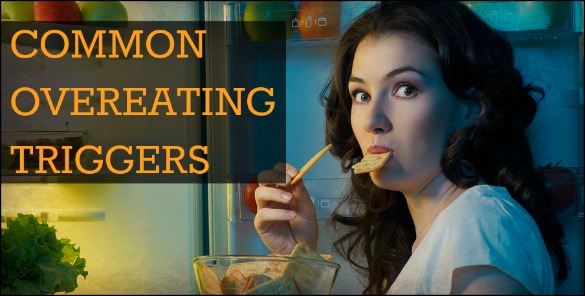Understanding Why You Gained Weight
Most of us have put on a few pounds at one time or another. Whether it’s the freshman 15, baby weight that kept coming on after baby or simply a gradual 5 pounds here, 10 pounds there, we all gain weight because of something. It can be a change in lifestyle, stress, boredom, loneliness—the list goes on and on.No matter the reason, there is something that triggered you to gain. And understanding that reason is paramount to either losing the weight or making sure you don’t regain it if you’ve lost it. That’s why today’s guest post is all about the reasons why you gained weight.
Judith J. Wurtman, co-author of The Serotonin Power Diet is an expert and researcher of carbohydrate craving, serotonin and emotional well-being. She is the founder of a Harvard University hospital weight-loss facility and counsels private weight-management clients. She has written five books, including The Serotonin Solution, and more than 40 peer-reviewed articles for professional publications. So basically, she knows her ish. Read on to learn more about, well, you!
Know Why You Gained Weight: It May Stop You from Regaining It
Sharon, my new weight-loss client, laughed when I asked her whether she had been on any other diets. “How much time do you have? My mother probably put me on a my first diet when I was around 11. Since I am now 50, that means 40 years of dieting.”
I nodded. The story was a familiar one. The only clients who had never been on a diet were people who had gained weight from medication such as antidepressants. All the rest had bounced from one weight-loss program to another, often following whatever was fashionable. Some had even had bariatric surgery to drastically reduce the amount of food they could swallow. Yet they had managed to gain weight by constantly eating small amounts of extremely caloric foods.
Sharon talked about her inability to control her eating when she switched from liquid low-calorie beverages or calorie-controlled prepackaged meals to her own food. She related how much she overate when she went offdiets without carbohydrates or three-day fasts or a week of residential spa food. She was now considering surgery but she wasn’t heavy enough to qualify.
She told me that she thought her weight gain was due to her love of food, but when I pointed out that many thin people love food also, she grew quiet. Eventually she said that she suspected she ate out of emotional needs. “My needs keep changing but my response is always the same. When I eat, my problems disappear—for the moment.”
Dieters like Sharon are likely to regain their weight unless they have insight into the causes of their overeating and are helped to develop strategies to control it. Unfortunately, diet programs tend to focus on how to get the dieter to his or her weight-loss goal rather than giving the dieter tools to prevent the weight from reappearing again. Even Oprah Winfrey, who certainly receives more support in her weight-loss efforts than the average dieter, has lost and regained weight continually during her television career.
The most effective way of preventing weight gain after a diet is to tackle the problems that caused it. Although each of us has our own overeating triggers, usually they can be grouped into a few categories.
Common Overeating Triggers
1. Logistics or too much to do and too little time to do it. Sometimes the problems caused by impossible schedules seem insurmountable and affect everything from the ability to shop for food to getting too little sleep. Often the dieter’s life has to be brought under control before the eating can be controlled. With either family or professional help (like a life coach), this usually can be accomplished. One client, who used to overeat when she came home from work and found the beds unmade and dirty breakfast dishes in the sink, solved her problems by making her kids get up earlier and doing chores before school.
2. Work schedules, business travel and meals, toxic supervisors and fear of unemployment. Some work situations place almost unlimited obstacles in front of the dieter, especially when personal relationships are involved. And these days, the option of leaving a virulent workplace is difficult. Recognizing how work stress is affecting eating is an important first step. The dieter should seek out help, either from the weight-loss counselor or someone trained to deal with worksite problems, to develop strategies to deal with the problems. However, sometimes a job change is really necessary, as in the case of a client who worked as a pastry chef.
3. Family and social problems may influence everything from menu planning to emotional well being. Neither the dieter nor the diet counselor can hope to solve chronic problems that may have led to years of overeating. Recognizing them and seeking help (whether from a dating service, divorce lawyer or therapist) will increase your chance of not gaining weight after the diet is over. If the problems are particularly difficult to handle, it may even be wise for the dieter to consider putting weight-loss efforts on hold to concentrate on resolving the issues that caused the weight gain. Temporarily stopping the diet may also be necessary when financial, medical or family crises arise. Seeing how your eating changes when a crisis arises is helpful in preventing overeating after the diet is over and another crisis occurs.
4. Sabotage by friends, family, co-workers and casual acquaintances. Those who have not managed to lose weight may regard a successful dieter as a weight-gaining time bomb. Often subtle and not-so-subtle methods will be used to make the dieter overeat, such as asking the dieter if she has been very sick recently or mentioning that a particularly caloric dish won’t hurt her. Self-sabotage is also common, especially if the successful dieter is now complimented on his or her appearance. Many clients have told me that they both enjoy and resent the attention they receive when they have lost a lot of weight. A college student made herself gain about 75 pounds after losing that amount because guys who had ignored her the year before when she was fat asked her out on dates.
Losing weight is not as hard as keeping it off. Still, as someone who was called “butter-ball” in second grade, I know it can be done.
© 2010 Judith J. Wurtman, PhD, co-author of The Serotonin Power Diet. For more information, please visit www.SerotoninPowerDiet.com.
A big thanks to Dr. Wurtman for the fantastic information! Have you successfully kept weight off? What did you have to change? Tell us in the comments, ladies! —Jenn


